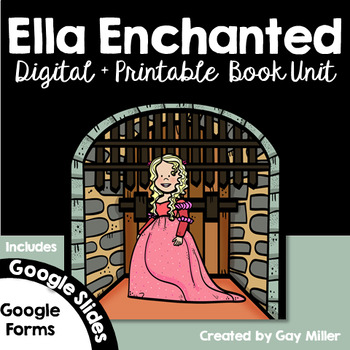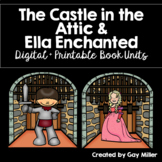Ella Enchanted Novel Study Digital + Printable Book Unit
- PDF
- Google Apps™

What educators are saying
Also included in
- The Castle in the Attic and Ella Enchanted Book Units Bundled contain lessons aligned to the Common Core Standards for grades 4 – 6. This comprehensive unit includes vocabulary, comprehension questions, constructed response questions, and lessons on writing informational texts. You will find the folPrice $9.00Original Price $15.00Save $6.00
Description
Dive into the enchanting world of Ella Enchanted with this comprehensive unit, designed for grades 5–6 and aligned with the Common Core Standards (CCSS). Whether you prefer printable activities or digital resources compatible with Google Classroom, this unit has you covered. Explore vocabulary, test comprehension with quizzes, engage in constructed response writing with planning organizers, and delve into language arts lessons—all inspired by Gail Carson Levine's novel.
✨ DIGITAL RESOURCES
This novel study includes links to digital resources.
I created multiple-choice comprehension questions using Google Forms.
I created open-ended questions, games, and organizers for students to write rules and examples on Google Slides, including constructed response writing and most skill lessons.
✏️ PRINTABLE RESOURCES
Vocabulary
• List (20 Focus Words)
• Bookmarks
• Word Cards
• Practice Booklet (8 Page Booklet)
• Vocabulary Test
Comprehension and Writing
- 10 Comprehension Checks
- 15 Constructed Writing Questions
9 English Lessons (Writing an Informative Essay)
- Citations (Creating a Bibliography)
- Taking Notes
- Outlining
- Topic Sentences
- Supporting or Detail Sentences
- Staying on Topic
- Concluding Sentences
- Writing an Introduction and Conclusion
- Title, Headings, Illustrations, and Graphics
Activities
- Middle Ages Vocabulary
- Castle Cake
- Tapestry
- Making necklaces
- Creature drawings
- Making scrolls & berry ink
- Ball hats
Answer keys for each practice page are included.
Please download the preview for a closer look.
°*”˜˜”*°•.¸☆*”˜˜”*°•.¸☆ ★ ☆¸.•°*”˜˜”*°•.¸☆*”˜˜”*°
If you want additional book units, click here for the full list of ★available titles.






